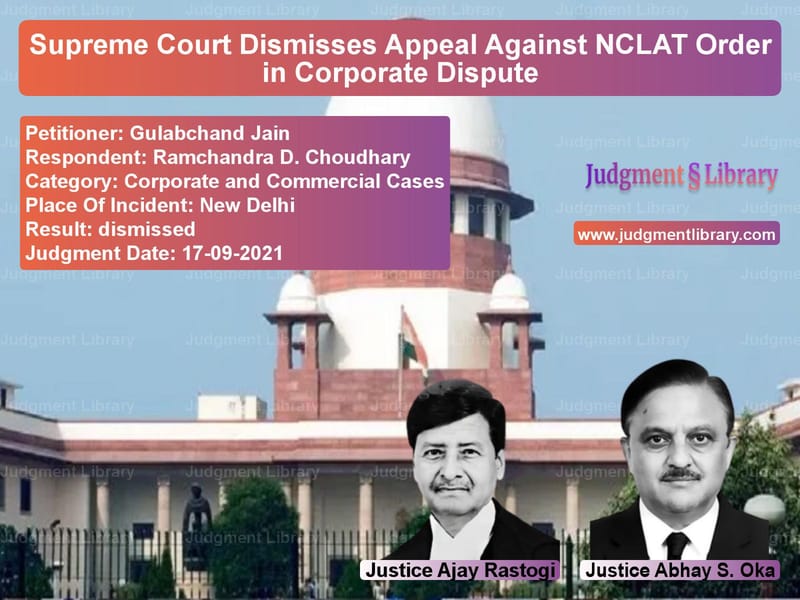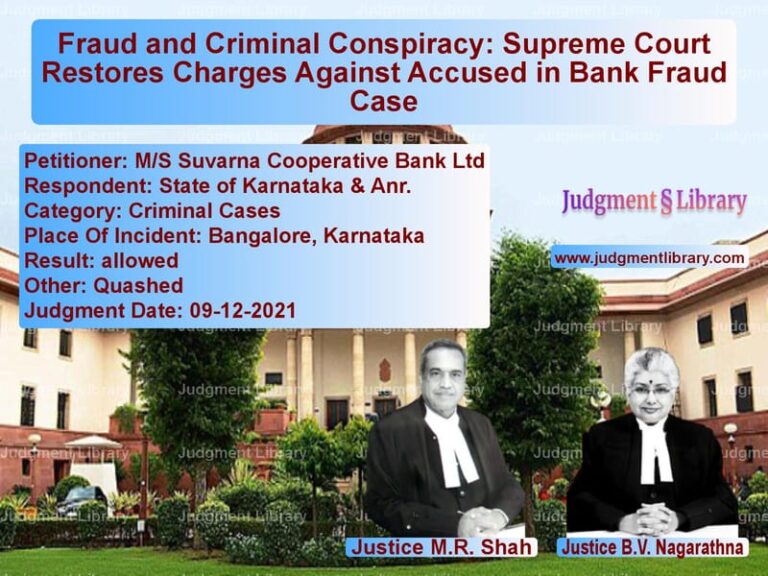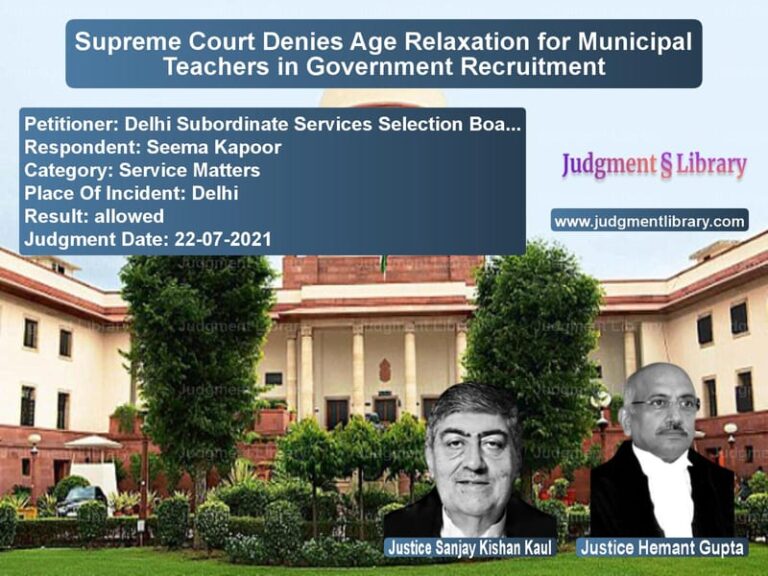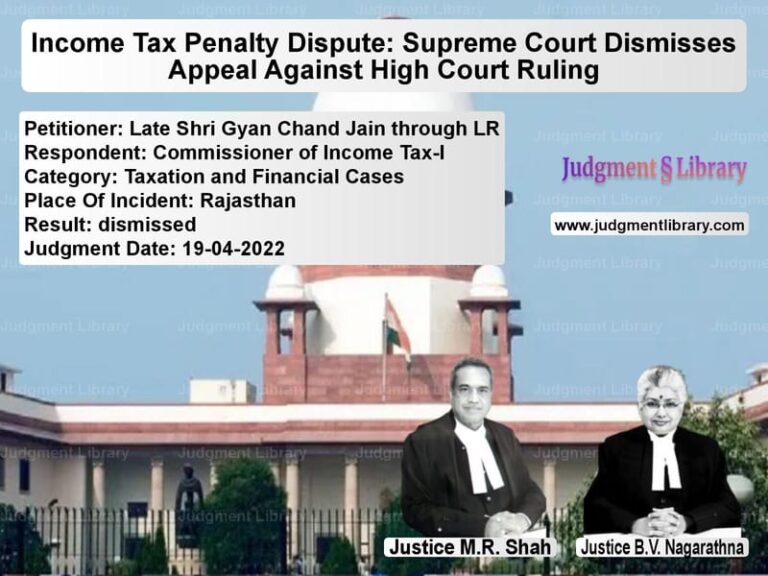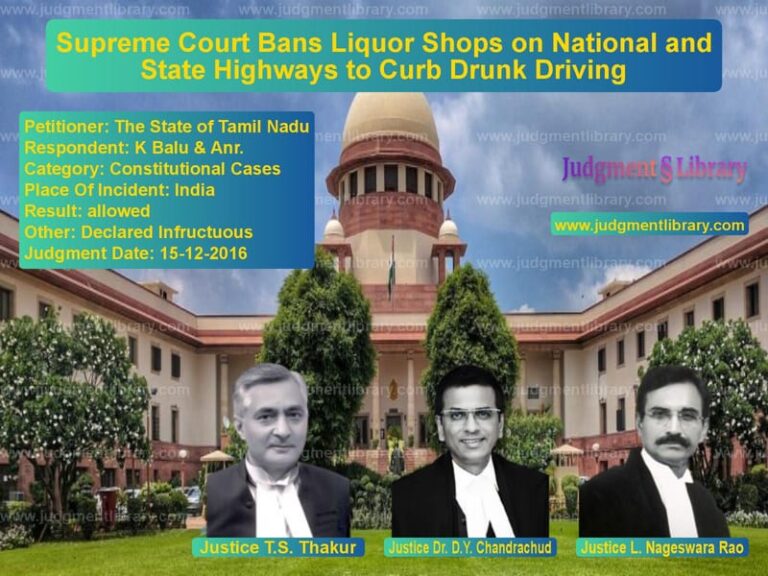Supreme Court Dismisses Appeal Against NCLAT Order in Corporate Dispute
The present case involves an appeal filed by Gulabchand Jain challenging an order passed by the National Company Law Appellate Tribunal (NCLAT), Principal Bench, New Delhi. The Supreme Court was tasked with determining whether the NCLAT’s decision required interference and whether the appellant had valid grounds for appeal.
The Supreme Court, after hearing the arguments presented by both parties, found no merit in the appeal and dismissed it accordingly. This judgment reiterates the limited scope of judicial interference in NCLAT orders unless substantial injustice is demonstrated.
Background of the Case
The dispute originated from a corporate disagreement between Gulabchand Jain (appellant) and Ramchandra D. Choudhary (respondent). The matter was first adjudicated by the National Company Law Tribunal (NCLT), which issued an order that was subsequently appealed before the NCLAT. The NCLAT upheld the NCLT’s decision, prompting the appellant to seek redress before the Supreme Court.
The primary contention in the appeal was whether the NCLAT had erred in affirming the NCLT’s ruling. The appellant sought relief from the Supreme Court, arguing that the decision was flawed and warranted reconsideration.
Legal Issues Considered
- Whether the NCLAT’s decision involved an error of law or a procedural irregularity.
- The scope of Supreme Court intervention in corporate disputes adjudicated by NCLAT.
- Whether the appellant demonstrated any substantial miscarriage of justice.
- Whether the NCLAT properly applied the principles of corporate law in its decision.
Arguments by the Appellant
- The appellant contended that the NCLAT failed to properly assess the facts and legal principles applicable to the case.
- He argued that the tribunal’s decision was biased and did not consider critical documentary evidence.
- He further maintained that the ruling had caused undue hardship and financial loss.
- The decision failed to consider relevant corporate governance principles that protect shareholders’ rights.
- He sought the Supreme Court’s intervention to restore fairness in corporate decision-making and dispute resolution.
Arguments by the Respondent
- The respondent defended the NCLAT’s decision, asserting that it was based on a thorough evaluation of facts and law.
- He argued that the appellant had not provided any compelling reason to warrant Supreme Court interference.
- The respondent highlighted that appellate review in corporate cases should be limited to correcting legal errors rather than re-examining factual determinations.
- The respondent contended that the NCLAT applied corporate governance norms correctly and adhered to the Companies Act, 2013.
- He emphasized that shareholder disputes should be resolved within the scope of corporate law and not through repeated litigation.
Supreme Court’s Observations
The Supreme Court, comprising Justices Ajay Rastogi and Abhay S. Oka, carefully examined the contentions raised by both parties before delivering its ruling.
- The Court observed that the NCLAT’s order was well-reasoned and did not suffer from any legal infirmity.
- It emphasized that the scope of judicial review over NCLAT orders is limited and should be exercised only in cases of manifest injustice.
- The Court noted that the appellant had failed to demonstrate any substantial error or bias in the tribunal’s decision.
- Since no exceptional circumstances were presented, the Court found no basis for interfering with the NCLAT’s ruling.
- The judgment reaffirmed that corporate disputes should primarily be resolved through established legal frameworks without unnecessary judicial intervention.
Final Judgment
The Supreme Court dismissed the appeal, stating that there was no valid reason to overturn the NCLAT’s order. The key directives included:
- The appeal was dismissed in its entirety.
- No costs were awarded to either party.
- Any pending applications were deemed disposed of.
- The NCLAT’s order was upheld as legally sound and procedurally correct.
Analysis of the Judgment
This ruling underscores the Supreme Court’s firm stance on the non-interference principle in corporate matters unless there is a clear violation of legal norms. By dismissing the appeal, the Court reinforced the idea that corporate disputes should be resolved through specialized tribunals, maintaining the efficiency and effectiveness of the legal system.
Read also: https://judgmentlibrary.com/corporate-insolvency-case-supreme-court-upholds-cirp-withdrawal/
Furthermore, the judgment sets a precedent that prevents unnecessary litigation in corporate governance cases, ensuring that shareholders and management adhere to the legal processes set forth by the Companies Act, 2013. The decision also serves as a reminder that appellate jurisdiction should not be misused for prolonging disputes that have already been adjudicated fairly.
Conclusion
This judgment reinforces the principle that the Supreme Court will not ordinarily interfere in NCLAT rulings unless there is a clear violation of legal principles. It serves as an important precedent for corporate litigants, emphasizing that appeals should be based on substantial legal grounds rather than mere dissatisfaction with tribunal decisions.
By upholding the decision of the NCLAT, the Supreme Court ensured that corporate governance disputes remain within the jurisdiction of the appropriate forums and that corporate laws are applied consistently and fairly. The ruling will likely influence similar corporate disputes in the future, emphasizing the importance of procedural fairness and judicial restraint.
Petitioner Name: Gulabchand Jain.Respondent Name: Ramchandra D. Choudhary.Judgment By: Justice Ajay Rastogi, Justice Abhay S. Oka.Place Of Incident: New Delhi.Judgment Date: 17-09-2021.
Don’t miss out on the full details! Download the complete judgment in PDF format below and gain valuable insights instantly!
Download Judgment: gulabchand-jain-vs-ramchandra-d.-choudh-supreme-court-of-india-judgment-dated-17-09-2021.pdf
Directly Download Judgment: Directly download this Judgment
See all petitions in Company Law
See all petitions in Corporate Governance
See all petitions in Shareholder Disputes
See all petitions in Judgment by Ajay Rastogi
See all petitions in Judgment by Abhay S. Oka
See all petitions in dismissed
See all petitions in supreme court of India judgments September 2021
See all petitions in 2021 judgments
See all posts in Corporate and Commercial Cases Category
See all allowed petitions in Corporate and Commercial Cases Category
See all Dismissed petitions in Corporate and Commercial Cases Category
See all partially allowed petitions in Corporate and Commercial Cases Category

